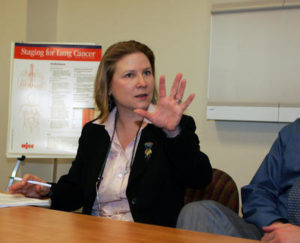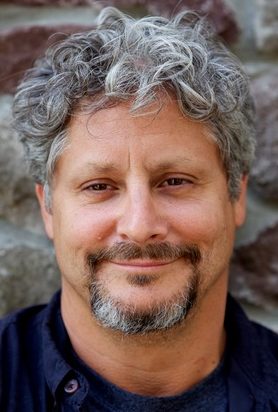By Victor Greto
On Jan. 8, 1981, Cindy Farach was bursting — with ideas, intensity and a passion for experimental science.
She also was bursting with child.
Less than a week after celebrating her own birthday, in three days the 23-year-old Ph.D candidate at the Medical College of Virginia would give birth to her first child, Mariana.
But after she opened up and read her graduate performance review that had been squirreled away in the campus mailbox, she weakly smiled in the same way she bore every patronizing look or comment she received in a field pregnant with men.
“Your research performance was judged to be good especially in light of your circumstances, i.e. impending motherhood,” the letter read. “The fact that you think independently … speaks highly of your intellectual competence,” it continued.
And, it said: “We wish you the best with your baby and recommend you take advantage of that fulfilling experience and return to the lab in February.”
This, from the guys who asked in her first interview why a pretty girl would want to be a biochemist.
Cindy Farach was back in school eight days after having her baby. She had to, she says.
“I was taking an immunology class,” explains Cindy Farach-Carson, 48, a professor of biological sciences at the University of Delaware.
“It was the start of spring semester, and it was a course I needed to finish,” she says. “It was only offered every other year.”

Farach-Carson — who was appointed director of the Center for Translational Cancer Research, which includes UD, Christiana Care’s Helen F. Graham Cancer Center, the Delaware Biotechnology Institute and the Nemours research institute — wanted to get her doctorate fast.
As quickly as she earned her high school diploma, which she did in three years. As quickly as she made it through the University of South Carolina, which she also did in three years. She would earn her doctorate in biochemistry at 24, the year after Mariana was born.
From Galveston, Tex., where she was born, to her high school years in Greenwood, S.C., to when she followed a mentor to the University of Texas in Houston, Farach-Carson had been slowly burrowing her way out of the South.
She ended up in Newark at the University of Delaware in 1998, where she has become “A top-notch scientist on the cutting edge of cancer research,” says Nicholas Petrelli, Medical Director at the Helen F Graham Cancer Center at the Christiana Care Hospital.
Specifically, in the study of bone cancer.
Scientists sometimes get stuck in dogma and lose interest in research, says Randy Duncan, who recently came to UD as an associate professor of biological sciences.
But not Farach-Carson, whom he has known since those days at the Medical College in Virginia. “She’s always excited about projects, and she passes that along to students and colleagues,” he says.
Now, during her sabbatical year, Farach-Carson has tightly taken the reigns of her job, based at the Christiana Care’s Helen F. Graham Cancer Center, and wants to ultimately change the health of the state.
“We’re setting up a center in a state that doesn’t have a medical school or a university hospital,” says Petrelli, who, along with Farach-Carson and her husband, Dan Carson, Chair of the UD biological sciences department, helped conceive the center. “We’ve developed this concept of no-walls medical school.”
In just one example of this cooperation, Farach-Carson’s study of bone metastasis of breast and prostate cancer is being aided by two Christiana Care medical oncologists, who provide her lab with small samples of fresh bone marrow from willing patients.
The idea of the center, she says, is to study the problem in the laboratory and then apply the solution at the bedside as soon as possible.
Eventually, “It will help reduce cancer and death rates in the state,” she says.
She’s as sure of that as she is of herself.
“I know I’m supposed to be doing this,” she says, the South lingering in her voice.
***
Farach-Carson, a “military brat,” is the oldest of four children born to Rose and Giles Schanen. Giles Schanen was attending medical school in Galveston when she was born, and later settled in the small town of Greenwood, S.C., after moving from base to base as an Air Force flight surgeon.
Giles was the only OBGYN in town, says Farach-Carson’s sister Carolyn Schanen, head of human genetic research at Nemours research center.
“There was no privacy,” she says. “If they didn’t know you, they know you’re dad. Everything you did came back to them.”
It was constricting and provincial enough for Farach-Carson to want to get out as soon as possible.
She wanted to be an animal veterinarian, her father wanted her to be a surgeon — “he wanted all of his children to be physicians,” says Schanen — but it wasn’t until she was invited to work in a lab at the University of South Carolina that she found her calling as a research scientist.
No matter how esoteric or apparently innocuous it may have been, her first published paper as an undergraduate — dealing with cell growth in the media of a bread mold — shaped the rest of her life
“I just started running experiments and had a sense of belonging,” she says. “It’s why I do what I do now. I couldn’t wait to see what would happen when I placed the cells in their media.”
Discovery is addictive, she says.
“When you do this, you’re the only person who knows this discovery,” she says of the scientific eureka moment.
Much of her research has focused on bone-forming cells called osteoblasts, says Duncan.
Current medication that attempts to help the elderly and their fragile bones, such as Fosamax, block processes that eat away at the bone.
“The object is to make bone,” he says. “In aging, you lose bone in a very defined process. We’re trying to understand how to reverse that process and build bone.”
Another focus of her research centers on how and why cancer cells, especially in prostate cancer, if not detected early enough, invariably migrate to the bone.
“We’re trying to figure out how and why it gets there and how to get it out,” she says.
Farach-Carson became viscerally rapt with the study of bones and their structure when she saw and couldn’t take her eyes off the hand of one of her classmates at South Carolina.
“He could hold a textbook in just one of his hands,” she says of the basketball player Alex English. “That fascinated me.”
Bones’ permanence, or their lasting value as fossils also has captivated her interest. “All the rest of us goes away eventually, but bones last forever,” she says.
***
There were lots of barriers to her success. The attitudes of the men at the Medical College were commonplace.
“That’s still a mentality expressed by some individuals today,” Petrelli says. It was that much worse when he went through college and medical school training during the late 1960s and early 1970s.
“It still exists, but not the way it was,” he says.
“Cindy will tell you there is an opinion that women are still in that role,” Duncan says, “that men assume they’re not serious about research. But it is going away.”
That said, “I never had a day in my life where I didn’t think I’d be a mom,” Farach-Carson says.
She married in 1978 after she became enthralled with the brilliant son of a physics teacher she met in class at the University of South Carolina, named Horatio Farach. They separated in 1984, the same year she had her second child, Andrew.
She later met and married Dan Carson, another man whom she characterizes as brilliant. She worked with him at the University of Texas in Houston, and married him in 1986. They have one child together, Kevin, who was born in 1990.
Because of her energy and time management skills, Farach-Carson is able to do it all, says her sister Carolyn Schanen.
“I don’t know how she does all that she does,” says Schanen, a respected scientist herself. “She manages to make it to soccer games, gets grants and papers written, mentors graduate students. I’ve given up on the social part of my life. I don’t have kids. I knew there was no way I’d do that. I would rather die than go to a soccer game.”
She doesn’t only mentor or counsel female students, either.
“She’s been a mother figure here for me,” says Dan Oristian, 23, a UD graduate student and would-be molecular biologist.
Oristian, who often talks to Farach-Carson over a beer to discuss both his work and his love life, says he came here to UD because of its reputation as a research facility.
But Farach-Carson will be cutting back some of her mentoring and teaching for more research and her new role.
“You reach a point where you want to do something bigger,” she says, “and it requires all the lessons learned to affect a change.”
Trying to get the results of her bone cancer research to patients as soon as possible has become her current passion.
“At the university you’re focused on publishing papers,” she says. “But if the research isn’t getting to the patient, we’re not accomplishing what we want to do.”
